In the rapidly evolving landscape of engineering education, few fields have captured attention quite like mechatronics. This interdisciplinary marvel, which seamlessly blends mechanical engineering, electronics, computer science, and control systems, represents the future of technological innovation. Yet, for all its promise and potential, mechatronics education presents unique challenges that traditional classroom settings often struggle to address effectively.
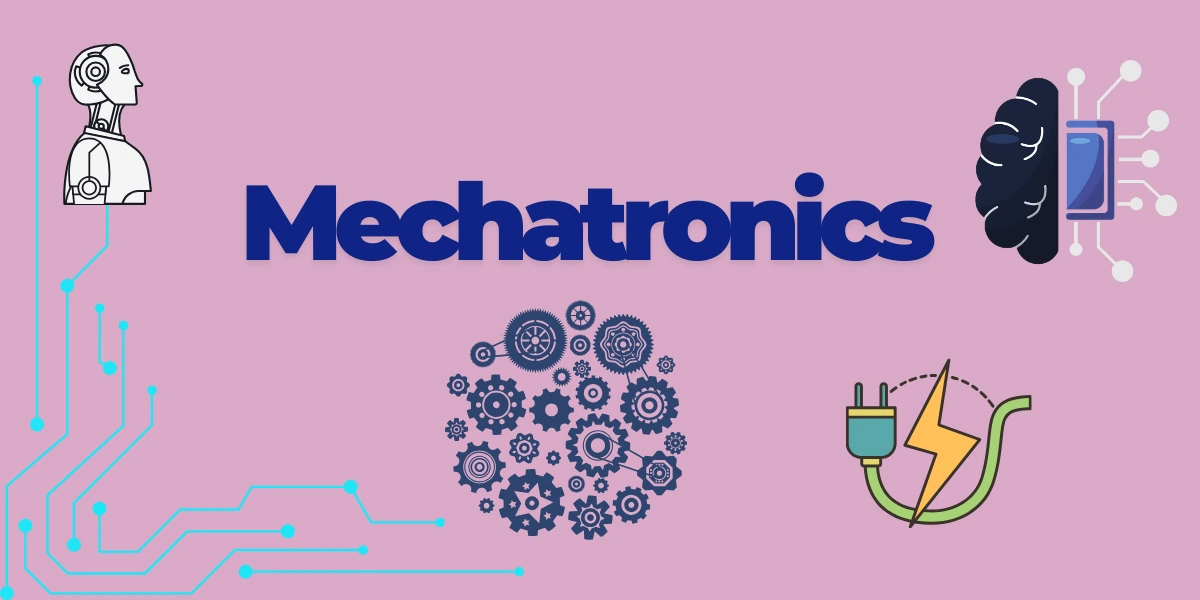
Understanding the Complexity of Mechatronics Education
Mechatronics engineering represents a unique educational challenge because it requires students to master multiple, traditionally separate engineering disciplines simultaneously. Unlike students studying pure mechanical or electrical engineering, mechatronics students must develop competency across several domains:
Mechatronics is not just a single subject; it is a convergence of four distinct engineering fields. To visualize how these disciplines interact to create intelligent systems, refer to the diagram below.
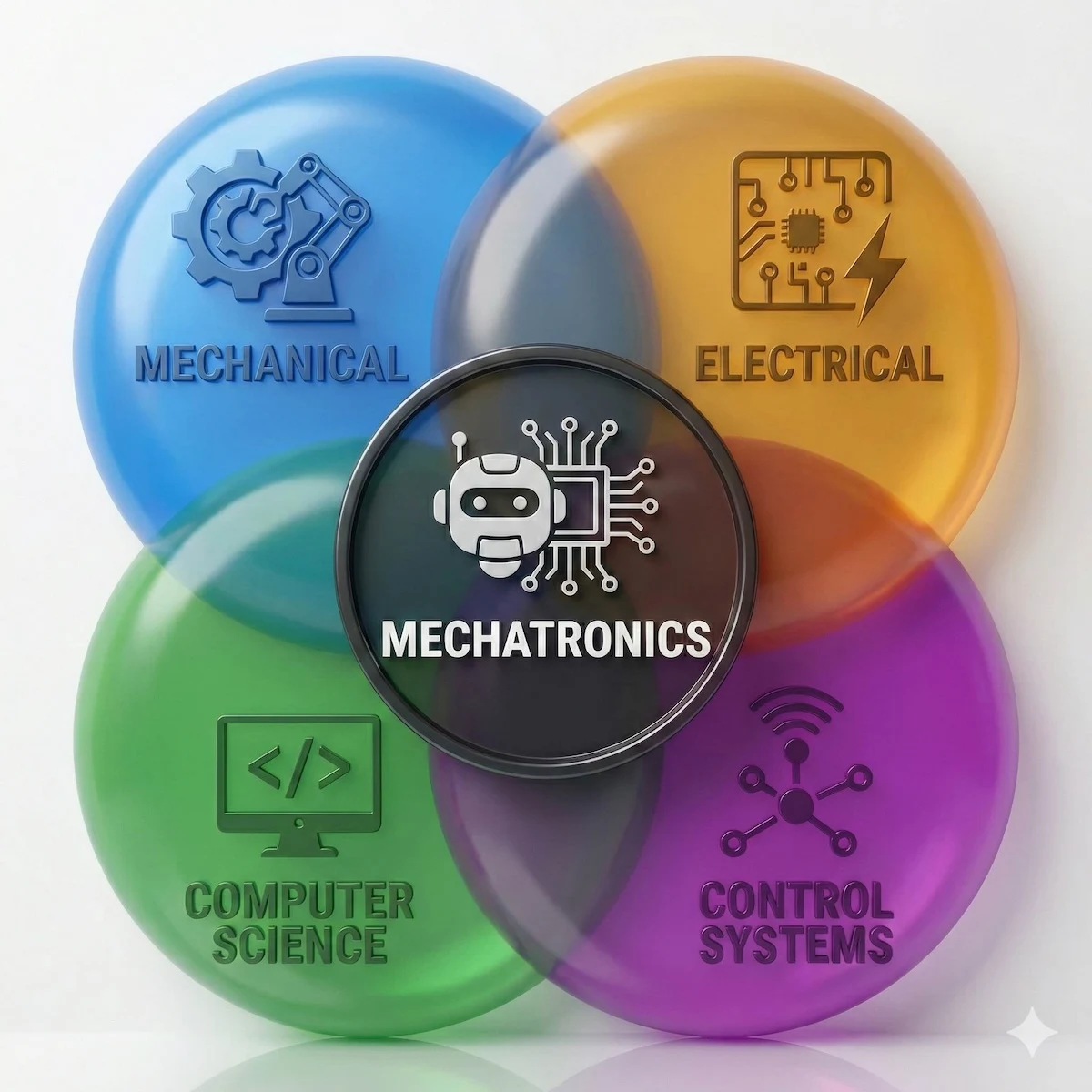
Mechatronics is the intersection where mechanical design, electronics, computing, and control theory meet.
As you can see, the ‘sweet spot’ lies in the center, where mechanical design, electrical power, software logic, and control stability all overlap.
Mechanical Engineering Foundations: Students must understand statics, dynamics, materials science, thermodynamics, and mechanical design principles. They need to grasp how physical systems move, interact, and transfer energy.
Electrical and Electronics Engineering: This encompasses circuit analysis, power electronics, signal processing, and electromagnetic theory. Students must learn to design and analyze electronic circuits that interface with mechanical systems.
Computer Science and Programming: Modern mechatronic systems rely heavily on embedded systems, microcontrollers, and sophisticated software. Students need proficiency in programming languages like C++, Python, and specialized real-time systems programming.
Control Systems Theory: Perhaps the most challenging aspect, control theory requires mathematical sophistication to understand how to regulate system behavior through feedback mechanisms and advanced control algorithms.
Common Challenges Facing Mechatronics Students
Research conducted by educational institutions worldwide has identified several persistent challenges that mechatronics students encounter throughout their academic journey:
Integration Complexity
The primary challenge in mechatronics education lies in integration complexity. Students often excel in individual components but struggle to understand how mechanical, electrical, and computational elements work together harmoniously. A study published in the IEEE Transactions on Education found that students frequently view control systems and electronics as “additions” to mechanical processes rather than integrated components of a unified system.
Many students feel overwhelmed by these integration issues, but specialized support can directly address these pain points. The comparison below highlights exactly how expert tutoring transforms these common struggles into manageable learning objectives.
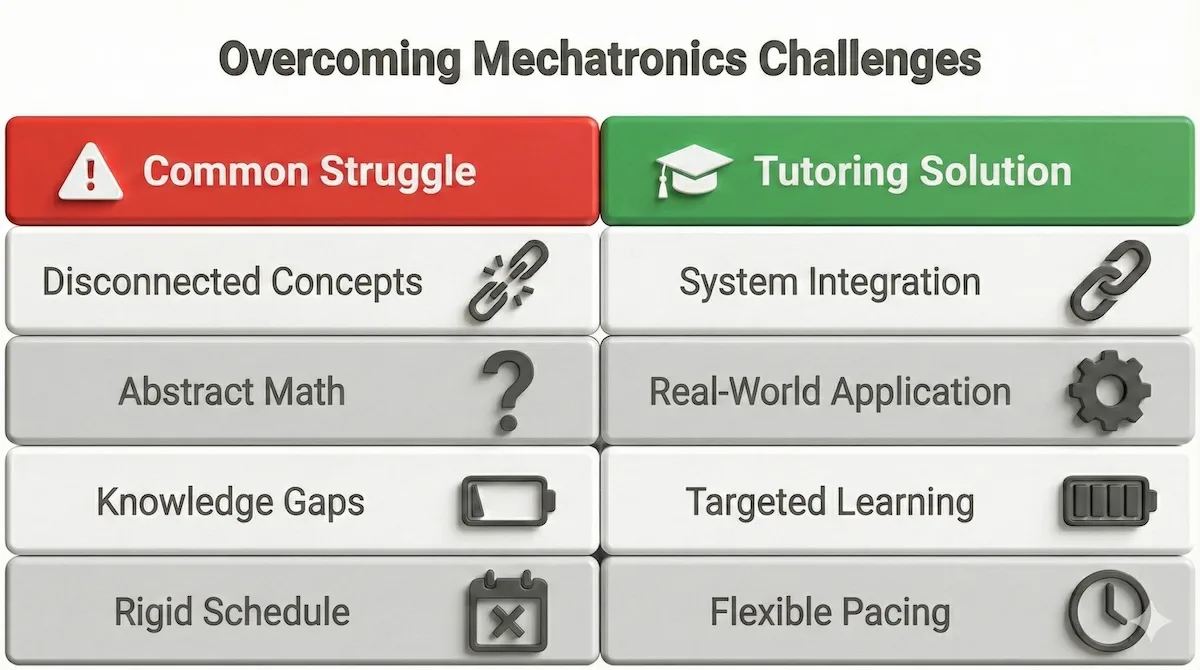
See how personalized tutoring addresses the specific ‘integration complexity’ gaps that classroom learning often misses.
By shifting the focus from isolated abstract concepts to real-world system integration, tutoring bridges the gap that traditional classroom lectures often leave wide open.
Mathematical Prerequisites and Application
Mechatronics demands sophisticated mathematical modeling and analysis skills. Students must be comfortable with calculus, differential equations, linear algebra, and complex analysis. However, many students struggle to see mathematics as an enabling tool rather than an obstacle, particularly when applying abstract mathematical concepts to real-world engineering problems.
Interdisciplinary Knowledge Gaps
Students entering mechatronics programs come from diverse academic backgrounds. Some may have strong mechanical engineering foundations but limited electronics experience, while others might excel in programming but struggle with mechanical design principles. These knowledge gaps create uneven learning experiences and can hinder overall comprehension.
Laboratory and Hands-On Experience
Effective mechatronics education requires extensive hands-on experience with integrated systems. However, many educational institutions face resource constraints that limit students’ access to modern equipment and comprehensive laboratory experiences. A research study from the University of Technology Bahrain found that students consistently report difficulties in laboratory activities due to insufficient hands-on experience.
The Role of Personalized Tutoring in Mechatronics Education
Given these challenges, personalized tutoring has emerged as a critical educational resource for mechatronics students. Unlike traditional classroom instruction, which must cater to diverse learning needs simultaneously, personalized tutoring can address individual knowledge gaps and learning styles effectively.
Addressing Individual Learning Styles
Research published in Educational Psychologist demonstrates that when instructional methods align with students’ learning preferences, academic performance can improve by up to 50%. Mechatronics tutoring online provides the flexibility to adapt teaching methods to individual needs, whether visual learners benefit from circuit diagrams and mechanical drawings, kinesthetic learners need hands-on simulation exercises, or auditory learners prefer detailed verbal explanations of complex concepts.
Flexible Scheduling for Complex Subject Matter
Mechatronics concepts often require extended time for comprehension and application. Traditional class schedules may not provide sufficient time for students to fully grasp complex topics before moving to new material. Online tutoring offers flexible scheduling that allows students to spend additional time on challenging concepts without the pressure of keeping pace with a predetermined curriculum.
Expert Knowledge Across Multiple Disciplines
Effective mechatronics teaching requires instructors who possess deep knowledge across multiple engineering disciplines. Specialized tutors can provide insights that generalist instructors might lack, helping students understand not just individual concepts but also how different engineering disciplines complement and enhance each other.
The Advantages of Online Mechatronics Tutoring
The digital transformation of education has made mechatronics tutor online services increasingly sophisticated and effective. Several key advantages have emerged:
Access to Global Expertise
Online mechatronics tutoring connects students with expert practitioners and educators worldwide. Students in smaller cities or regions with limited local expertise can access the same high-quality instruction available in major technological centers. This democratization of educational access has been particularly important for students pursuing specialized fields like mechatronics.
Technology-Enhanced Learning Tools
Modern online tutoring platforms incorporate sophisticated tools that enhance mechatronics education. Interactive whiteboards allow tutors to demonstrate circuit designs and mechanical schematics in real-time. Screen sharing enables collaborative work on CAD software and programming environments. Virtual laboratories provide simulated experiences with mechatronic systems that might be too expensive or complex for individual ownership.
Cost-Effective Education Solutions
Traditional in-person tutoring for specialized subjects like mechatronics can be prohibitively expensive, particularly when expert knowledge is required. Online tutoring typically costs $25-50 per hour compared to $60-100+ for in-person sessions, making expert instruction more accessible to a broader range of students.
Recorded Sessions for Review and Reinforcement
Online tutoring sessions can be recorded, allowing students to review complex explanations multiple times. This is particularly valuable in mechatronics, where understanding often develops gradually through repeated exposure to interconnected concepts.
Specialized Areas Where Mechatronics Students Need Support
Experience working with mechatronics students has revealed several specific areas where targeted tutoring support proves most beneficial:
Control Systems Design and Implementation
Control theory is arguably the most abstract part of mechatronics, yet it is the brain behind the machine. Before diving into the math of PID controllers, let’s look at the fundamental structure of a feedback control loop.
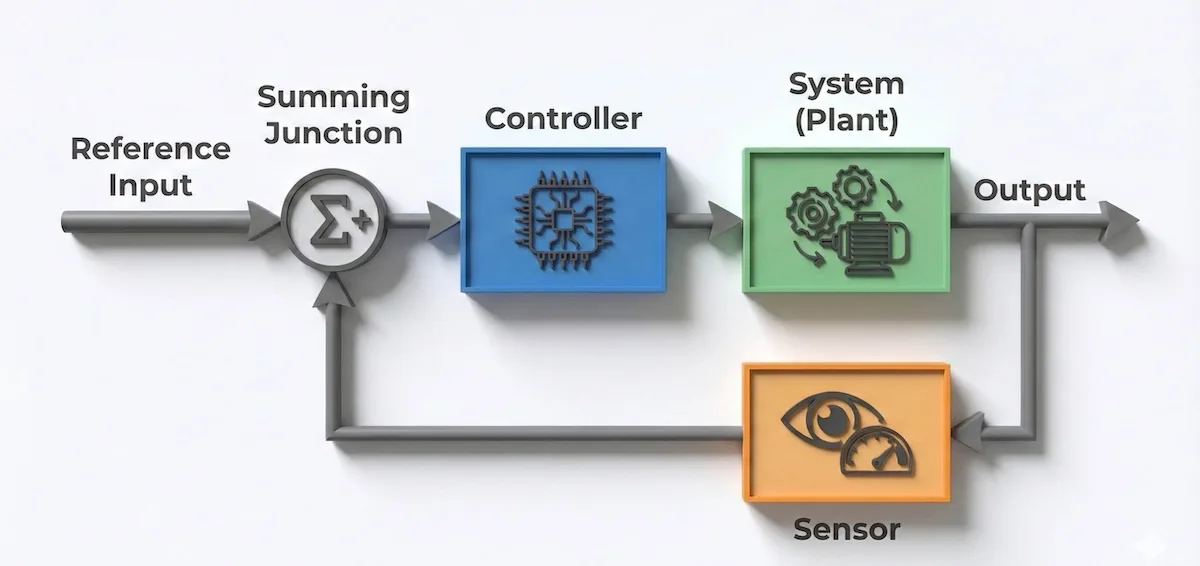
Mastering the feedback control loop is essential for mechatronics success—here is the fundamental structure visualized.
Understanding this flow—from the reference input to the sensor feedback—is crucial. Once you grasp this visual logic, the differential equations used to calculate the ‘error signal’ become much easier to interpret.
Control theory represents one of the most mathematically challenging aspects of mechatronics education. Students often struggle with concepts like transfer functions, stability analysis, and controller design. Specialized tutoring can help students understand both the theoretical foundations and practical applications of control systems in real-world mechatronic devices.
Embedded Systems Programming
Modern mechatronic systems rely heavily on microcontrollers and embedded processors. Students need support in understanding both the hardware architecture and software programming required to create intelligent mechanical systems. This includes real-time programming, interrupt handling, and sensor integration.
Sensor Integration and Signal Processing
Mechatronic systems depend on sophisticated sensing capabilities to interact with their environment. Students often need help understanding different sensor technologies, signal conditioning, analog-to-digital conversion, and noise reduction techniques.
System Integration and Testing
Perhaps the most challenging aspect of mechatronics involves integrating mechanical, electrical, and computational components into functioning systems. Students benefit from guidance on system architecture, interface design, and comprehensive testing methodologies.
Success Stories: How Expert Tutoring Transforms Learning Outcomes
The impact of specialized tutoring on mechatronics education can be dramatic. Consider the case of Michael, a mechanical engineering student who struggled with the electronics components of his mechatronics coursework. Through targeted online tutoring focused on circuit analysis and embedded programming, Michael not only improved his grades but also developed confidence to pursue advanced projects in robotics and automation.
Similarly, Elena, who had strong programming skills but limited mechanical engineering background, worked with a mechatronics tutor to understand mechanical design principles and their integration with control systems. The personalized instruction helped her see connections between software algorithms and physical system behavior, leading to innovative design solutions in her capstone project.
Choosing the Right Mechatronics Tutoring Support
Not all tutoring services are equally equipped to handle the complexity of mechatronics education. Students and parents should consider several factors when selecting tutoring support:
Instructor Qualifications and Experience
Effective mechatronics teachers should possess both academic credentials and practical experience across multiple engineering disciplines. Look for instructors with advanced degrees in mechatronics, robotics, or related fields, combined with industry experience in automation, robotics, or control systems.
Technology Infrastructure and Tools
Quality online tutoring requires robust technology platforms that support interactive learning. This includes capabilities for screen sharing, collaborative document editing, virtual whiteboards, and access to simulation software.
Personalized Learning Approaches
The best mechatronics homework help services assess individual student needs and adapt their teaching methods accordingly. This includes identifying knowledge gaps, understanding learning preferences, and developing customized learning plans that address specific challenges.
Comprehensive Subject Coverage
Mechatronics spans multiple engineering disciplines, so tutoring services should provide comprehensive coverage rather than focusing on isolated topics. Students benefit most from integrated instruction that shows how different engineering concepts work together.
The Future of Mechatronics Education and Tutoring
The mechatronics field continues to evolve rapidly, with emerging technologies like artificial intelligence, machine learning, and Internet of Things (IoT) integration creating new educational requirements. The Advanced Robotics Market is projected to grow from $53.74 billion in 2025 to $280.01 billion by 2034, indicating continued strong demand for mechatronics expertise.
Investing in this difficult degree pays off when you look at the industry trajectory. The chart below illustrates the explosive growth forecast for the advanced robotics and mechatronics market over the next decade.
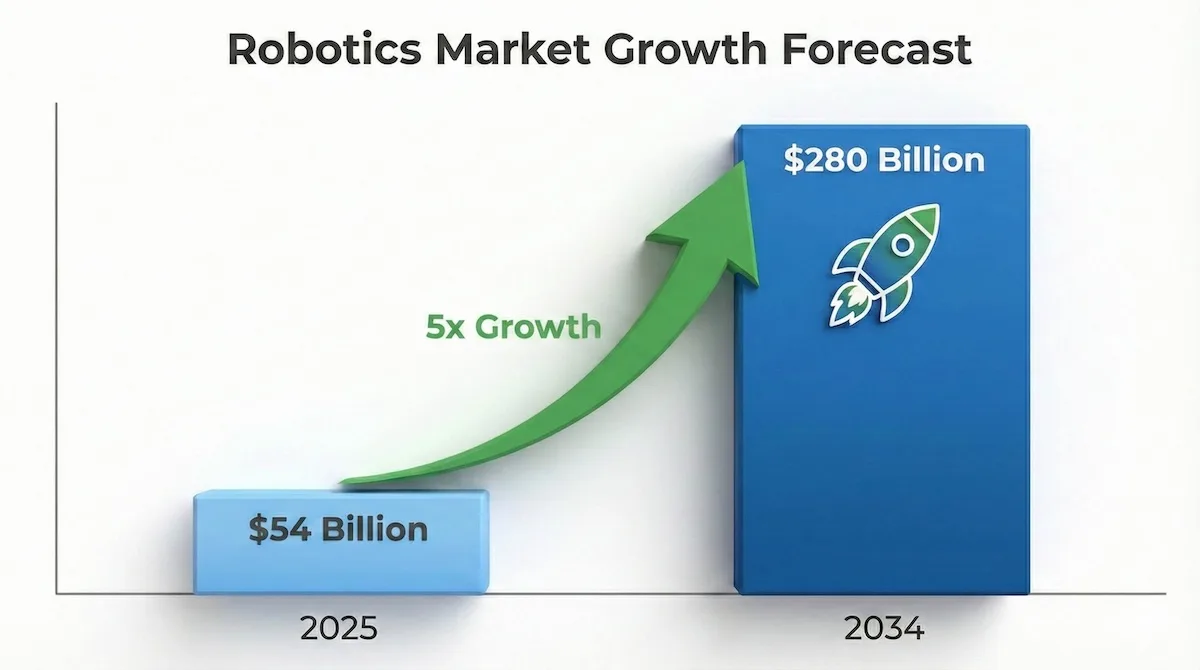
With the market projected to grow 5x by 2034, mechatronics expertise is one of the most future-proof skills you can acquire.
With the market expected to reach nearly $280 billion, the demand for engineers who can bridge the hardware-software divide is not just stable—it’s accelerating.
Educational institutions and tutoring services are responding by incorporating these emerging technologies into their curricula. Students now need support not only in traditional mechatronics subjects but also in AI integration, machine learning applications, and IoT system design.
Industry 4.0 and Smart Manufacturing
The rise of Industry 4.0 has created new opportunities for mechatronics professionals in smart manufacturing, predictive maintenance, and cyber-physical systems. Students pursuing careers in these areas benefit from specialized instruction that connects traditional mechatronics principles with modern industrial automation concepts.
Sustainable Technology Integration
Environmental concerns are driving demand for energy-efficient mechatronic systems and sustainable automation solutions. Tutoring services are increasingly incorporating green technology principles and energy optimization techniques into their instruction.
Practical Tips for Maximizing Tutoring Effectiveness
To get the best return on your investment in private tutoring, you need a strategy. Follow this 4-step workflow to ensure every session moves you closer to mastering the material.
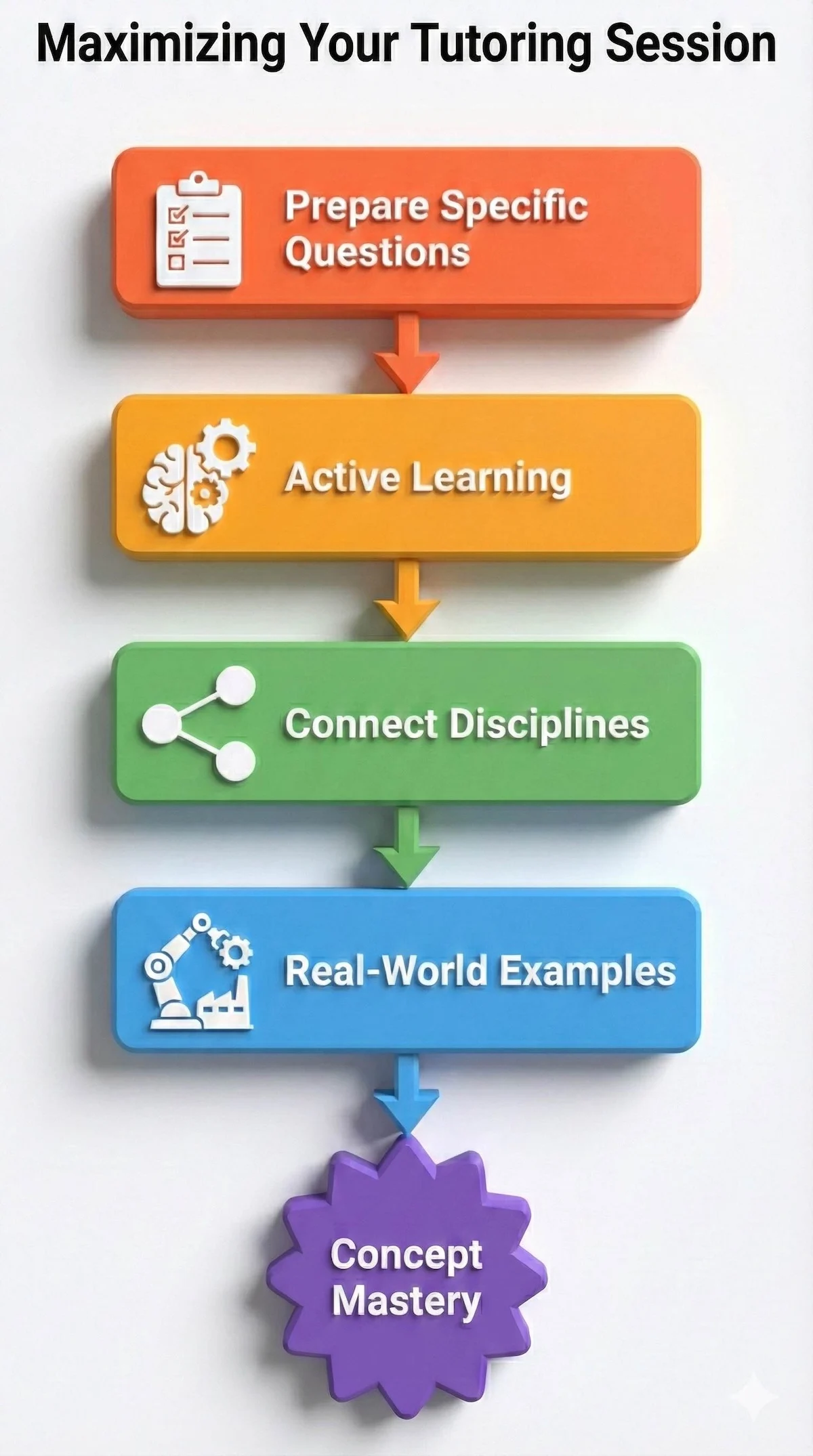
Follow this 4-step workflow to get the most value out of every single tutoring hour.
By preparing specific questions and actively connecting different disciplines during your session, you transform passive listening into active engineering problem-solving.
Students can enhance their tutoring experience by following several practical strategies:
Come Prepared with Specific Questions: Rather than asking for general explanations, prepare specific questions about concepts or problems you’re struggling to understand. This allows tutors to provide targeted assistance that addresses your particular challenges.
Practice Active Learning: Engage with the material during tutoring sessions by taking notes, asking clarifying questions, and attempting to solve problems independently with guidance rather than passive observation.
Connect Concepts Across Disciplines: Ask your tutor to help you understand how mechanical, electrical, and computational concepts relate to each other. This integrated understanding is crucial for success in mechatronics.
Work on Real-World Applications: Request that your tutor incorporate practical examples and applications that demonstrate how theoretical concepts apply to actual mechatronic systems.
Conclusion: Embracing the Future of Engineering Education
Mechatronics represents the future of engineering, a field where mechanical precision, electrical sophistication, and computational intelligence combine to create systems that seemed impossible just decades ago. However, mastering this interdisciplinary field requires more than traditional classroom instruction can provide.
Specialized tutoring, particularly through online platforms that connect students with expert instructors, has emerged as an essential component of successful mechatronics education. By providing personalized instruction, flexible scheduling, and access to global expertise, tutoring services help students navigate the complex challenges of this exciting field.
As the mechatronics industry continues its rapid growth, students who invest in comprehensive educational support, including expert tutoring, will find themselves well-prepared for rewarding careers at the forefront of technological innovation. The combination of strong theoretical foundations and practical application skills, developed through personalized instruction, creates graduates who can contribute meaningfully to the automated, intelligent systems that increasingly define our modern world.
The journey through mechatronics education may be challenging, but with the right support and guidance, students can master this complex field and prepare for careers that will shape the future of technology and engineering.
Frequently Asked Questions
Q1 What makes mechatronics more challenging than other engineering fields?
Mechatronics requires simultaneous mastery of mechanical, electrical, computer science, and control systems, creating integration complexity that traditional single-discipline fields don’t face.
Q2 How can online tutoring help with hands-on mechatronics concepts?
Online platforms use simulation software, virtual laboratories, and screen-sharing tools to provide interactive experiences that complement physical laboratory work.
Q3 What qualifications should I look for in a mechatronics tutor?
Seek tutors with advanced degrees in mechatronics or related fields, plus industry experience in automation, robotics, or control systems across multiple disciplines.
Q4 Is mechatronics tutoring more expensive than regular engineering subjects?
Online mechatronics tutoring typically costs $25-50 per hour, comparable to other specialized engineering subjects and more affordable than in-person expert instruction.
Q5 How long does it typically take to see improvement with mechatronics tutoring?
Students usually see comprehension improvements within 4-6 sessions, with significant performance gains emerging after 8-12 hours of targeted instruction.
Q6 Can mechatronics tutoring help with career preparation beyond academics?
Yes, expert tutors provide insights into industry applications, career paths, and practical skills that connect academic concepts to real-world engineering practice.
Related Subjects
3D Printing (Additive Manufacturing)
Arduino Uno
Automation Engineering
Automation Studio (by Famic Technologies)
Autonomous Systems
Avionics
Electrohydraulics & Electropneumatics
Electromechanical Systems
ESP32
ESP8266
FluidSIM
Microelectromechanical Systems (MEMS)
MPLAB
PIC Microcontroller
PLC (Programmable Logic Controller)
Proteus Simulation
Raspberry Pi
Real-Time Systems & RTOS
Robotics Engineering
SCADA (Supervisory Control And Data Acquisition)
STM32
System Dynamics
******************************
This article provides general educational guidance only. It is NOT official exam policy, professional academic advice, or guaranteed results. Always verify information with your school, official exam boards (College Board, Cambridge, IB), or qualified professionals before making decisions. Read Full Policies & Disclaimer , Contact Us To Report An Error
